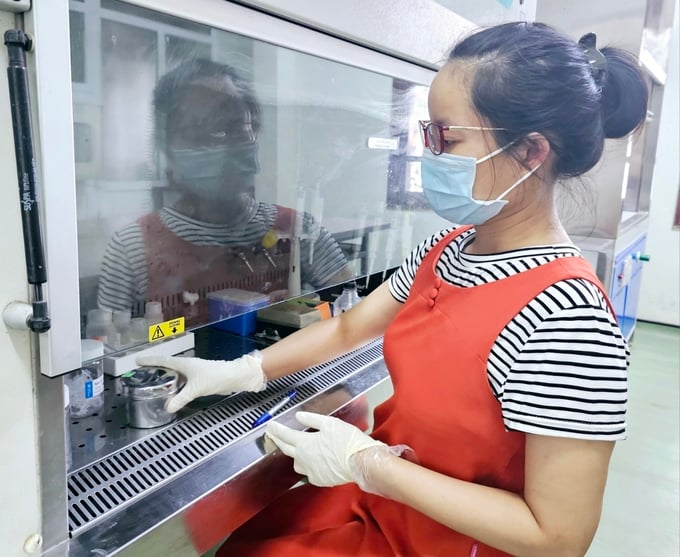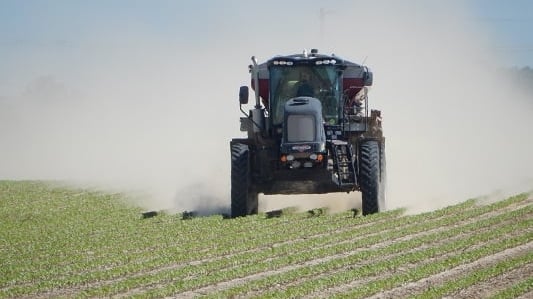May 17, 2025 | 17:27 GMT +7
May 17, 2025 | 17:27 GMT +7
Hotline: 0913.378.918
May 17, 2025 | 17:27 GMT +7
Hotline: 0913.378.918
Introduction:
Human resources are a decisive factor to ensure sustainable socio-economic development, and for the agricultural sector, it is even more vital. This series of articles will partly state the current situation and solutions to improve the quality of human resources for the agricultural sector.
It is currently the peak of the enrollment period, but Bac Giang Agriculture and Forestry University (Viet Yen district, Bac Giang province) only has a few lecturers and students in the middle of a spacious campus of more than 60 ha.

Dr. Mai Thi Huyen, the Vice Rector in charge of Bac Giang Agriculture and Forestry University. Photo: Hoang Anh.
More than 7 years ago, the development strategy for the 2015 - 2020 period, vision to 2030 of Bac Giang Agriculture and Forestry University set a target that by 2020 the number of undergraduate majors would range from 18 to 20, following the major career orientation in agro-forestry technology, agro-forestry product processing, food, natural resources and environment management. The training scale is expected to reach 6,000 to 8,000 students.
Times have changed, and in recent years, the school sets a target of 700 - 750 students each year, but never meets the quota. "There are majors like Forest Resource Management with only 6 students. Regardless of the situation, the school still organizes classes properly," said Dr. Mai Thi Huyen, the Vice Rector in charge of Bac Giang Agriculture and Forestry University.

Bac Giang Agriculture and Forestry University is still struggling to attract students. Photo: Hoang Anh.
Bac Giang Agriculture and Forestry University divides its 15 majors into two groups. The traditional agricultural training majors are in the first group, such as Crop Science, Animal Husbandry, Animal Health, Land Management, Natural Resources and Environment Management, Plant Protection, and Forest Resource Management.
These fields are the backbone of the agricultural industry, but it is as if the university is “fighting a losing battle”. Although Bac Giang Agriculture and Forestry University attracts students to certain majors by offering 100% tuition waivers, businesses place orders for trained students with a 100% commitment to getting a job after graduation, the lack of quotas is still a common story.

Student conducting scientific research at Bac Giang Agriculture and Forestry University. Photo: Hoang Anh.
Instead of sitting still and lamenting, many years ago, Bac Giang Agriculture and Forestry University was determined to innovate. "If we don't start the change from the mindset of teachers and the training programs, the situation will surely be even more dire. The first change is from intensive research training to practical applied training. When reality changes, the demands for human resources of businesses and localities change, the university must also change, create its own difference, otherwise we will not able to compete with other ‘big shots’ in the field of education," said Dr. Huyen.
In 2014, Bac Giang Agriculture and Forestry University was the pioneer in establishing the Center for Applied Research and Technology Transfer in Agriculture and Forestry, aiming towards autonomy. Three main employees include the director, the deputy director and the accountant. The center is invested in terms of land, incubator systems, facilities, and factories for both production and transfer.
According to the university’s leader, after many years of nurturing, so far the center has been able to be financially self-sufficient, becoming one of the rare units in the university system that can succeed with this model. There are three other affiliated units also being built in the orientation of the autonomy model: Than Nhan Trung High School, Center for Foreign Languages - Informatics and Center for Experience Travel Services.

New Hope Group sets up a machine room and arranged human resources in the university to both serve training and perform testing. Photo: Hoang Anh.
The most obvious change in mindset is the model of associating with enterprises in training agricultural human resources. There are officially 19 businesses that have really effective training links with the university, mostly in the form of ordering mechanisms and scholarship support mechanisms. “New Hope Group set up a machine room and arranged human resources right in the university to both serve training and perform testing. Vietnam Dabaco Group opens pig and chicken farms in the university as a place for students to practice while also building product brands,” said Dr. Huyen.
Not only domestic enterprises, Bac Giang Agriculture and Forestry University also becomes more open to the association for international training. For example, the study of the Chinese Language is currently in the form of 3.1, meaning that students study 3 years in Vietnam and 1 year in China, the same for other countries such as Japan, Israel, and Denmark.
Domestic and foreign enterprises and research centers receive students participating in this type of work - study associated program for internships. The students can participate in experiential activities with enterprises and receive direct guidance from skilled engineers during the internship.

Associating with businesses to train human resources is the direction Bac Giang Agriculture and Forestry University aims for. Photo: Hoang Anh.
Another thing to note is that Bac Giang Agriculture and Forestry University is also a pioneer in implementing the model of "high school in a university". In 2019, Than Nhan Trung High School was established with just 230 students. Although the first course only had 30 students continuing their studies at the local university, the experiences about agriculture outside the regular curriculum have gradually changed their mindset about the current agricultural professions. They soon realized that modern agriculture was not only about growing rice and raising pigs but also about high-tech machinery, science, logistics, and many more.
By the second enrollment course, the high school has approximately 1,200 students and will pilot a class specializing in agriculture, expecting 60 students to attend. The school has also signed with Bac Giang province a strategy to develop human resources with a twist, in which the province will support access to the local high school system so that teachers can provide vocational guidance to students.
It may still be hard for Bac Giang Agriculture and Forestry University to meet the 750-student quota, but the teachers there do not feel too much pressure. Since 2021 Bac Giang Department of Culture - Sports - Tourism has decided to recognize the school as one of the province's eco-tourism sites. Of course, there are still many entangled mechanisms, the road ahead is still bumpy, but this is actually a fresh direction, freeing the school from the existing gloomy state.

The ecosystem on the campus of Bac Giang Agriculture and Forestry University. Photo: Hoang Anh.
In the campus spanning more than 60 ha is the natural landscape, a unique ecological reserve that is rarely found anywhere else. There is a water bird ecosystem that has been preserved for decades with a number of up to 10,000 individuals and 14 species.
The university’s lake is 30 ha wide, which can develop recreational fishing services, relaxation and experience tourism. Next to it is a forest of nearly 3.5 ha wide, of which the water bird conservation forest area is 1.3 ha, the remaining 2.2 ha is a green forest, an ideal place for experience activities in the forest.

The beauty of the university’s campus. Photo: Hoang Anh.
Right in the middle of the campus there is the first vineyard applying high-tech agriculture in the North. The vineyard harvests two crops a year, but to teachers and students, what truly brings value is that visitors can come to the vineyard, take photos and buy high-quality grape products as gifts. Then there is a lotus pond, a flower garden with seasonal flowers, and a water park where students and their families can come and relax.
All of these become new values. Leaders like Dr. Huyen have faith that this university will become an attractive training destination for agricultural human resources.
Translated by Samuel Pham

(VAN) Hue City rigorously enforces regulations regarding marine fishing and resource exploitation, with a particular emphasis on the monitoring of fishing vessels to prevent illegal, unreported, and unregulated (IUU) fishing.

(VAN) Hanoi People's Committee has issued a plan on reducing greenhouse gas emissions in the waste management sector with 2030 vision.

(VAN) Vietnam's draft amendment to Decree No. 156 proposes a mechanism for medicinal herb farming under forest canopies, linking economic development to population retention and the sustainable protection and development of forests.

(VAN) In reality, many craft village models combined with tourism in Son La have proven effective, bringing significant economic benefits to rural communities.

(VAN) The international conference titled Carbon Market: International experiences and recommendations for Vietnam was successfully held recently in Ho Chi Minh City.

(VAN) According to the Project on rearranging provincial and communal administrative units, in 2025, the country will have 34 provinces/cities, 3,321 communes, wards, and special zones, and no district-level organization.

(VAN) The vice president of fertilizer with Stone X Group says the Trump administration’s tariffs are impacting fertilizer markets.